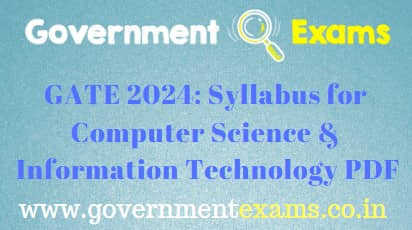GATE 2024: Syllabus for Computer Science & Information Technology (CS) Topic-wise
The Graduate Aptitude Test in Engineering (GATE) is a comprehensive examination that assesses the knowledge and understanding of candidates in various engineering disciplines. For CS aspirants, GATE 2024 presents an opportunity to showcase their expertise and secure admission to postgraduate programs or employment in the public sector. The syllabus for Computer Science & Information Technology (CS) is meticulously designed to cover all the essential topics that a prospective engineer should master. Check the complete GATE syllabus for Computer Science & Information Technology (CS) 2024 PDF below for free download:
Overview of the Syllabus:
The GATE 2024 Computer Science & Information Technology syllabus is divided into two main sections: General Aptitude and subject-specific knowledge. The General Aptitude section tests the verbal and numerical ability of the candidates, while the subject-specific section delves into the core areas of Computer Science & Information Technology.
To see and download the complete GATE Computer Science & Information Technology Syllabus PDF, check the link – GATE CS Syllabus PDF
General Aptitude:
This section includes:
- Verbal Ability: Grammar, vocabulary, sentence completion, and verbal analogies.
- Numerical Ability: Numerical computation, estimation, data interpretation, and quantitative reasoning.
Engineering Mathematics:
Engineering Mathematics is a critical component of the GATE CS syllabus, encompassing topics such as:
- Discrete Mathematics: Propositional and first-order logic, sets, relations, functions, partial orders, and lattices, groups. Graphs: connectivity, matching, coloring.
- Linear Algebra: Matrices, determinants, system of linear equations, eigenvalues and eigenvectors, LU decomposition.
- Calculus: Limits, continuity, and differentiability, maxima and minima, sequences and series, tests for convergence.
- Probability and Statistics: Random variables, uniform, normal, exponential, Poisson and binomial distributions, mean, median, mode, and standard deviation, central limit theorem.
Core Computer Science Topics
The core topics are extensive and include:
- Digital Logic: Boolean algebra, combinational and sequential circuits, minimization, number representations, and computer arithmetic (fixed and floating-point).
- Computer Organization and Architecture: Machine instructions and addressing modes, ALU, data path and control unit, instruction pipelining, memory hierarchy: cache, main memory, and secondary storage; I/O interface (interrupt and DMA mode).
- Programming and Data Structures: Programming in C, recursion, arrays, stacks, queues, linked lists, trees, binary search trees, binary heaps, graphs.
- Algorithms: Searching, sorting, hashing, asymptotic worst-case time and space complexity, algorithm design techniques: greedy, dynamic programming, divide-and-conquer, graph search, minimum spanning trees, shortest paths.
- Theory of Computation: Regular expressions and finite automata, context-free grammars and push-down automata, regular and context-free languages, pumping lemma, Turing machines, and undecidability.
- Compiler Design: Lexical analysis, parsing, syntax-directed translation, runtime environments, intermediate code generation.
- Operating System: Processes, threads, inter-process communication, concurrency, synchronization, deadlock, CPU scheduling, memory management, and virtual memory.
- Databases: ER-model, relational model: relational algebra, tuple calculus, SQL, integrity constraints, normal forms, file organization, indexing (e.g., B and B+ trees).
- Computer Networks: Concept of layering, LAN technologies, flow and error control techniques, routing algorithms, congestion control, TCP/UDP and sockets, IPv4/IPv6, routers and routing protocols (e.g., OSPF), network security: authentication, basics of the public key and private key cryptography, digital signatures and certificates, firewalls.
Preparation Strategy for GATE CS & IT 2024:
To excel in GATE 2024 for CS & IT, candidates should:
- Begin by thoroughly reviewing the syllabus and identifying the high-weightage topics.
- Develop a study plan that allocates sufficient time for each subject area.
- Refer to standard textbooks and online resources for in-depth understanding.
- Solve previous years’ GATE question papers to familiarize yourself with the exam pattern.
- Take mock tests to assess your preparation level and improve your time management skills.
The GATE 2024 CS & IT syllabus is extensive and requires dedicated preparation. Aspirants should focus on understanding the fundamental concepts and applying them to solve complex problems. With a strategic approach and consistent effort, candidates can achieve a high score in GATE 2024 and pave the way for a successful career in Computer Science Engineering.

